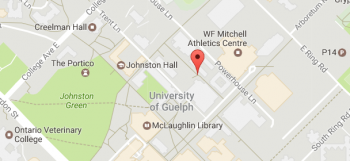Meet Alaina Osborne:

About Alaina
Alaina Osborne graduated from the University of Guelph with a degree in Studio. While in school, she completed an Experiential Learning course called The Italian Heritage Project, where she interviewed family and dug into her own personal history to dissect, analyze, and reflect on the journeys and lives of her late nonni. Through this experience, she was able to better understand her own identity, while discovering details of her family history. Her work in this experiential learning course was brought into her Studio Art practice, as she used images and ideas from her research in the Italian Heritage Project to create artworks for other courses. Alaina shares her experience in the course, more about her research and studio practice, as well as her thoughts on experiential learning.
Can you start by telling us a little more about the Italian Heritage Project? What is it and what was your role in it?
“The Italian Heritage Project is an initiative in collaboration with the Italian Canadian Archives Project (ICAP) and the University of Guelph. It allows U of G students and community members to collect and preserve Italian Canadian narratives and artifacts. In my case, I interviewed my mom and aunts, looked through over 200 photographs and analyzed stories and images through a variety of theoretical lenses (gender, memory, religion, migration etc.) to better understand the journeys and lives of my late nonni (grandparents).”
Can you elaborate on what your research project was about?
“My project was about exploring and preserving my own family history, understanding the lives of my nonni and the greater experiences of immigrants everywhere. Since I was delving into my own lineage, I also learned about my identity as well.”
How did the research for this course tie into your studio work?
“My studio work was completely inspired by the ideas that were coming up in my experiential course. I painted portraits of my nonni from the research photos, I recreated intimate, hand-written notes on a larger wall scale for people to interact with and I even took portraits of myself inspired by the undocumented moments of my nonna's life. (It was really a reflection of what life would be like for me if I grew up in her era). So a lot of playing with memory, time, identity, family and gender.”
What was your favourite thing that you learned or discovered throughout this course?
“I discovered just how vital it is to ask our relatives about their lives, their parents' lives and experiences, etc. We have to understand where we came from in order to understand who we are.”
How did you discover this course, and what encouraged you to take it?
“I met my adviser, Prof. Sandra Parmegiani, while interviewing her for an article I was writing for SPARK (Students Promoting Awareness of Research Knowledge). I was excited to hear about her research, as someone with Italian heritage, so I jumped on the chance to enroll after she encouraged me.”
How did this course differ from other courses you were taking?
“The course allowed me to design my own project, with the guidance of Prof. Parmegiani. It wasn't about reading a mandatory textbook and regurgitating information. It pushed me to be creative, independent and empowered to explore what I was curious to learn about.”
Is there anything you'd say to someone considering an experiential learning course?
“Experiential Learning is really the best way to learn in my opinion. It gives you an opportunity to go into the "real world" and I found it more stimulating than just sitting and staring at a screen in a lecture for 3 hours. In my experience, it allowed me to learn in a new and creative way.”
Is there anything you'd like to add?
“You can check out this research project and the art I produced around it [1] online and you can also read the SPARK article [2] I wrote about it."


